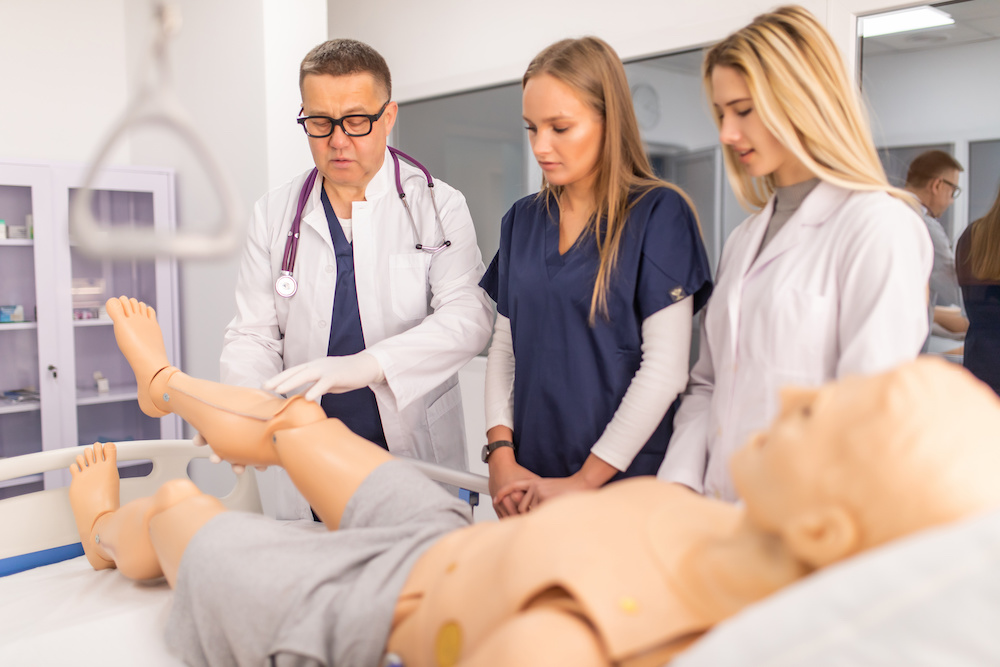Medical Simulation Jobs – Listings and Tools
Medical Simulation jobs, aka Healthcare Simulation jobs, provide an emerging professional opportunity for innovative healthcare professionals interested in clinical education and training, advanced technologies, theatrical production, adult learning, administrative leadership and the most modern communicative practices.
Below is a comprehensive list of Healthcare Simulation Jobs which usually fit into one of three key areas: Administration, Clinical Education, and Simulation Technology operations. Further down is a set of links to resources which will help employers and employees better prepare for medical simulation careers. Looking to gain international attention to your newly posted healthcare simulation position? Post your healthcare simulation job now!
We have 2 options for your consideration below, all of which will immediately post a your healthcare simulation career position to our global audience to varying degrees! Read the benefits below and Email us for questions or any posting issues. Have Technical Issues Posting Your Job? Simply email us your job posting and we will post your job manually!
Sponsored Content:
Both Clinical Simulation Job Posting Options Include:
- Featured On HealthySimulation.com’s:
- Job Listing Page , Homepage & All Content Pages (40,000+ readers per month)
- Bimonthly Newsletters (30,000+ subscribers)
- Shared to Social Media Followers (40,000+):
- LinkedIn: 33,000+
- Twitter: 6,000+
- Facebook: 2,000+
Standard Featured Listing (60 Days): $347 USD Flat Rate ($5.78/Day)
Extended Featured Listing (90 Days): $395 USD Flat Rate ($4.39/Day)
Post Your Medical Simulation Job Listing Here Now!
(Note: The positions listed above are active for specific time periods, and may no longer be available.)
Sponsored Content:
Tools for Healthcare Simulation Employers
- Clinical Simulation Center Personnel: Who You Need to Succeed
- The Right Stuff: Finding the Best Healthcare Simulation Personnel
- Simulation Coordinator Job Description w/ Downloadable Template
- Simulation Technician (Experienced) Job Description w/ Downloadable Template
- Simulation Technician (Entry Level) Job Description Downloadable Template
- How to Become a Simulation Nurse Educator
- Core Concept Video Presentation: How to Increase Technical Support Staff for Your Healthcare Simulation Program
- Best Practices for Hiring Medical Simulation Champions
- When Hiring a Sim Tech First Consider…
- What to REALLY Look for When Hiring a Sim Tech
- Great Interview Questions When Hiring Simulation Team Members
- New Simulation Program Webinar
- How To Increase Lab Staff Without Increased Budgets
- Simulation in Healthcare Education, A Best Evidence Practical Guide
- Why Do Healthcare Simulation Programs Hire Sim Techs Without Technical Backgrounds?
- Community Agrees – Sim Techs Need Technical Background
Tools for Building Your Simulation Resume
- Ultimate Job Guide for Simulation Technology Specialists
- How To Start a Career as a Medical Simulation Technician
- How Much Should Sim Techs Earn?
- Video Introduction to a Medical Simulation Lab: What is Simulation?
About Medical Simulation Positions
Healthcare Simulation Technician: A Healthcare Simulation Technician is a professional who works to implement, develop, participate in and operate healthcare simulation activities to guarantee a safe, high-quality, and consistent clinical simulation experience. They are also responsible for assisting in the management of a center’s infrastructure to ensure that student privacy, operational efficiency, limited downtime, and learning objectives are all met.
Healthcare Simulation Techs will also troubleshoot and resolve any technical and logistical issues, and operate a healthcare simulation capture system to ensure activities are videotaped. Other responsibilities of these professionals include: providing first and second level repairs and preventative maintenance to simulation resources; ensuring that equipment and supplies are used and maintained properly; planning, developing, and manufacturing materials and techniques for executing moulage and task trainers; and maintaining current simulation related knowledge, communications and customer service.
To become a Healthcare Simulation Technology Specialist, professionals are minimally required to have an associate’s degree, but a Bachelor’s Degree is highly recommended. Those that possess three to five years of healthcare simulation experience will find themselves very desirable as the profession is so new! Certification as a Certified Healthcare Simulation Technology Specialist (CHSOS) in this field is also strongly preferred.
Healthcare Simulation Educator: A Healthcare Simulation Educator is part of a team whose goal is to develop and implement clinical simulation-based education and training designed to enhance patient safety and quality during healthcare delivery. These professionals are responsible for the coordination of a number of key healthcare simulation programs delivered by an educational center including the development of educational programs, teaching, coordination, and administrative tasks. Depending on the particular facility, the Simulation Educator may also assist with clinical session preparation and break-down, the operation of simulators, and by taking the role of faculty actor in immersive simulation training sessions.
Healthcare Simulation Educators may have earned at minimum a Bachelor’s of Nursing degree, but typically have Advanced healthcare degrees in Nursing (MSN), Medicine (MD), Education (Ph.D.), or similar. The underlying academic degree depends to some extent on the requirements of the institution where the simulation takes place. Some degrees can be in education, healthcare, or a related field.
Healthcare Simulation Administrator: A Healthcare Simulation Administrator is responsible for the administration, strategy, management, and leadership of a simulation educational or training program. These professionals manage and oversee all aspects of staffing, create and oversee policies and procedures, liaison between all collaborative stakeholders, support training, educational, and research program development, as well as promote and represent the program.
To gain employment as a Healthcare Simulation Director, learners should obtain a master’s degree and ideally multiple years of related experience in either healthcare, technology, management, or education. Oftentimes, a master’s degree in a nursing-related field and a current registered nurse license are strongly preferred, however, other areas of study may be suitable.
Learn More About Medical Simulation Jobs
Sponsored Content:














